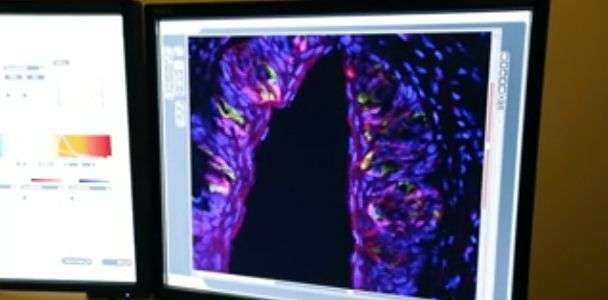Team discovers key step in how taste buds regenerate

Researchers at the University of Colorado Anschutz Medical Campus have discovered a key molecular pathway that aids in the renewal of taste buds, a finding that may help cancer patients suffering from an altered sense of taste during treatment.
"Many cancer drugs, which circulate throughout the entire body, will target a tumor but in the process affect healthy cells," said the study's senior author Linda Barlow, PhD, professor of cell and developmental biology at CU Anschutz. "That in turn will alter a person's sense of taste leading to malnutrition, weight loss and sometimes death."
The study was published in the most recent edition of the journal PLOS Genetics.
Cancer patients, including those with colon and head and neck cancer, often experience significant alteration of their sense of taste during treatment with chemotherapy or radiation. Food may have no taste, a metallic taste or taste so bad that it's impossible to swallow.
"Taste dysfunction can...result from an alteration of the renewal capacities of taste buds and is often associated with psychological distress and malnutrition," said the study's lead author Dany Gaillard, PhD, an instructor in cell and developmental biology at CU Anschutz.
Gaillard said that understanding how taste cells renew throughout adult life and how new cells replace old cells as they die is essential in finding potential therapies to improve taste sensitivity in those patients impacted.
Using mouse models, the researchers discovered that a protein in the Wnt pathway, called ß-catenin, controls the renewal of taste cells by regulating separate stages of taste cell turnover. The protein is crucial in developing taste buds in embryos and is a regulator of the renewal of epithelial tissue in adults including skin, hair follicles, intestine and the inside of the mouth.
"We show that activating this pathway directs the newly born cells to become primarily a specific taste cell type whose role is to support the other taste cells and help them work efficiently," said Barlow.
As chemotherapy in general destroys dividing precursor cells including those that produce taste cells, activating Wnt signaling may be a way to renew taste buds after chemotherapy.
This approach could form the basis for developing "complementary treatment to help restore normal taste function to avoid malnutrition and psychological distress for these patients," the study said.
New small molecule drugs are being developed that specifically block the Wnt pathway and may be effective for some tumor types. Gaillard and Barlow predict these could also cause taste dysfunction.
Barlow said that there is still a lot to learn about how taste is altered at the cellular level.
"But this discovery holds the promise of helping us develop ways to dramatically improve the quality of life for cancer patients," she said.
More information: Gaillard D, Xu M, Liu F, Millar SE, Barlow LA (2015) β-Catenin Signaling Biases Multipotent Lingual Epithelial Progenitors to Differentiate and Acquire Specific Taste Cell Fates. PLoS Genet 11(5):e1005208. doi:10.1371/journal.pgen.1005208


















